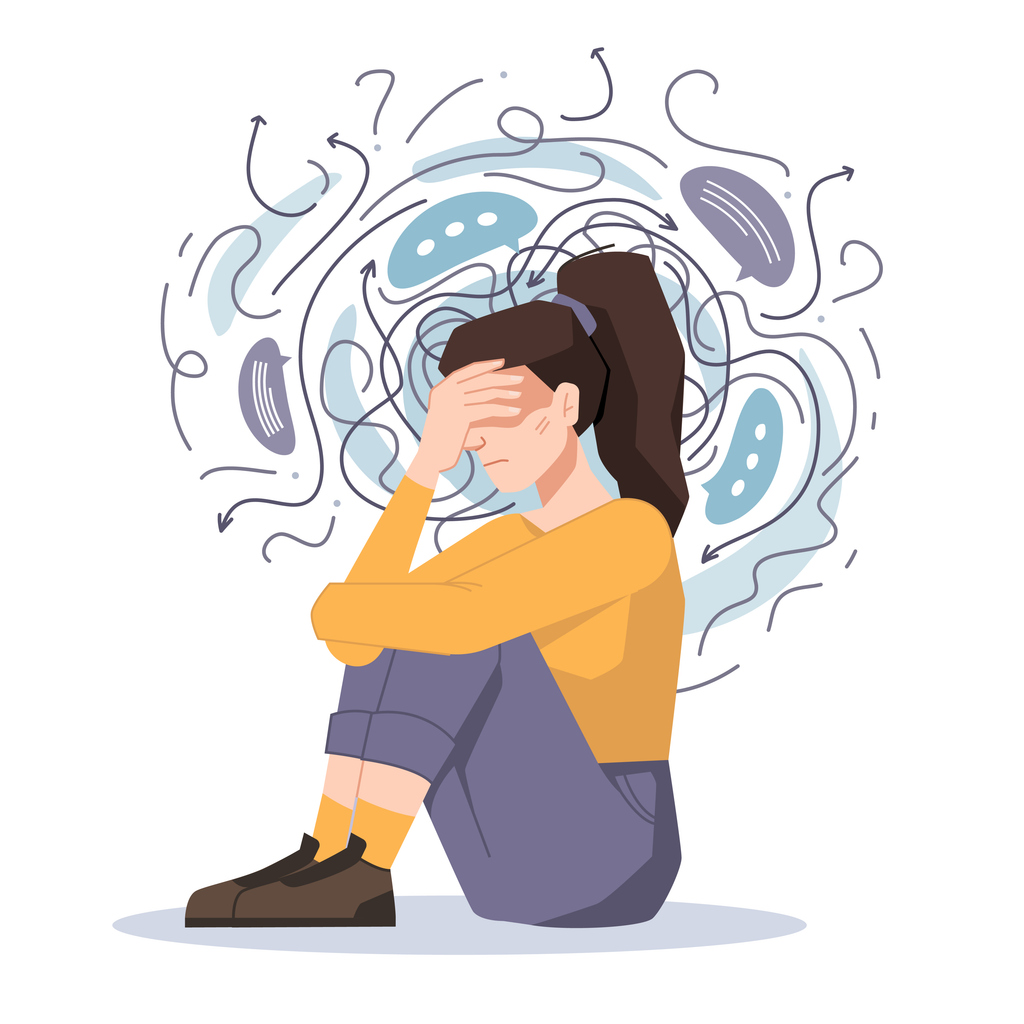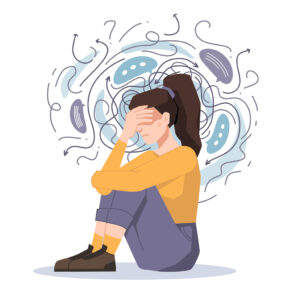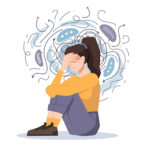A Holistic Path to Regaining Self-Worth: homeopathy offers a life-altering intervention
From Homepathy Today Spring 2025
By Alexis White and Samantha Conboy
 Lisa looked out her window and saw neighbors gathered in the street talking. She longed to join them, to be included. But Lisa stayed inside, trapped by negative thoughts about herself. She wanted homeopathy to help boost her low self-esteem. “I immediately think everyone hates me; I’m not worthy. People don’t or won’t like me; I’m a complete failure in all relationships. I am never going to be good enough.”
Lisa looked out her window and saw neighbors gathered in the street talking. She longed to join them, to be included. But Lisa stayed inside, trapped by negative thoughts about herself. She wanted homeopathy to help boost her low self-esteem. “I immediately think everyone hates me; I’m not worthy. People don’t or won’t like me; I’m a complete failure in all relationships. I am never going to be good enough.”
Homeopathy shines among available strategies for addressing low self-esteem. A well-chosen homeopathic remedy can help a person release long-held patterns and beliefs authentically and organically. Rather than trying to change how or what they think from an outward or intellectual standpoint, the change comes from within.
Read on to see how homeopathy helped Lisa and Brianna, whom you will meet later in this article, become more self-confident and learn to like themselves. Their stories illustrate how homeopathy was a life-altering intervention, powerfully and gently addressing their low self-esteem and self-critical thinking.
Low self-esteem and self-loathing
Low self-esteem—lacking self-confidence and doubting one’s abilities—can stem from negative early life experiences, societal pressures, unresolved emotional trauma, and sexual, emotional, and physical abuse. Individuals internalize unpleasant experiences, affecting the way they think of themselves. Negative thoughts become so ingrained that people mistake them for reality. A person with low self-esteem may feel inadequate, doubt themselves, and experience fatigue, digestive issues, and sleep disturbances.
Self-loathing (self-hatred) can manifest as feelings of inferiority, hopelessness, and sometimes suicide (See Help Is Available on Page X). Individuals dealing with low self-esteem and accompanying feelings of self-loathing often compare themselves to others and cannot set boundaries or pursue meaningful goals.
Lisa: Embarrassed to be me
During our first appointment, Lisa, a 38-year-old mom of two young children, said, “I have intense feelings of self-hatred. I am embarrassed to be me. I want homeopathy to make me a different person. For example, when I look out my window and see several neighbors getting into another neighbor’s car, I spiral out of control. The neighbor invited them but not me. She probably doesn’t like me, and the other neighbors will soon realize they don’t like me either.”
Lisa felt awkward, socially excluded, and incapable of changing her situation. She said, “I’m an alien who has been dropped here, never belonging anywhere.” Lisa longed for connections but believed no one wanted to be her friend.
Negative self-talk, a common practice among individuals dealing with low self-esteem, varies in intensity and frequency depending on the individual and generally focuses on feelings of self-disgust, self-contempt, guilt, and shame.1 Most people participate in negative self-talk fleetingly, but for others like Lisa, it happens more frequently.
Perfection v. failure
Lisa expected perfection from herself and all aspects of her life: health, work, kids, car, friends, husband, and family. She confided that she had postponed scheduling her appointment with me until she could present her symptoms “perfectly.”
Lisa felt like a failure when her actions and life fell short of her high expectations, so she attempted to “stay in control.” She responded to life situations by “doing her duty of stepping up and taking responsibility,” actions which she strived to execute perfectly even though they felt like a burden.
Lisa’s health history
Lisa had an extreme fear of cancer, was excessively worried about something terrible happening to her children, and still intensely grieved years later after her mother’s death. Physically, she had ovarian cysts, a low libido, disrupted sleep, and extreme thirst during the night. Her menstrual periods were heavy with dark, clotted blood. In the past, she had sinusitis, strep throat, bronchitis, pneumonia, vaginitis, yeast infections, and the human papillomavirus (HPV), which resulted in a loop electrosurgical excision procedure (LEEP) to remove pre-cancerous tissue. Her family history included diabetes, cancer, and heart disease.
Seeking longer-term healing
When I begin a remedy search, I try to determine the miasm of the simillimum—the remedy with the greatest chance of restoring overall health. As noted in Herrick and Morrison’s book, Miasm of the New Millennium, a miasm is an inherited genetic blueprint that reveals how a person responds to adversity.2 Lisa had described symptoms that matched the Cancer miasm, such as perfectionism, efforts to control everything, a strong fear of cancer, and a family history of cancer, as defined by Rajan Sankaran in his book The Sensation in Homoeopathy.3
Over several months, I suggested Lisa take remedies associated with the Cancer miasm, including Carcinosin and Staphysagria. Each remedy helped but did not offer long-term support. When triggered, Lisa’s shame, embarrassment, and feelings of worthlessness resurfaced. So, she repeatedly came back demanding a better remedy. Lisa wanted perfection, for which I am grateful because I learned so much in the process.
I worked with Lisa over many years, recommending additional remedies associated with low self-confidence, such as Thuja and Natrum carbonicum, the belief of being friendless, such as Magnesia muriaticum, and others targeting feelings of self-loathing. After each dose, Lisa reported improvement but never longer-term healing.
A remedy breakthrough
Then, a triggering event finally allowed me to understand the heart of her dis-ease. Lisa received a snarky message from her next-door neighbor about the location of Lisa’s newly installed fence, even though she had taken great pains to include her neighbor’s opinions during planning. The note threw Lisa into a tailspin because she did not want to disappoint her neighbor. Even this slight criticism made her feel shameful and “bad” and spiraled her into dark, despairing thoughts.
When Lisa and I discussed her reaction to the neighbor’s snarky note, I learned that she wanted to feel connected to people but also longed for them to like her. Any hint of upsetting or angering someone thrust Lisa into a state of self-loathing. She isolated herself and obsessively dwelled on how worthless she was, often wishing she was dead—Lisa was seeing a Licensed Professional Counselor who was monitoring this symptom. At that moment, I realized Lisa was telling me that she relied entirely on others’ opinions to feel worthy. Lisa also reported dreaming that aliens imprisoned her and raped her daily. She felt powerless, hopeless, shameful, and despairing in the dream. Our discussion about the snarky note, plus the details from the dream, helped point the way to the remedy Germanium metallicum.
A well-matched remedy
The remedy Germanium metallicum comes from germanium, a metalloid chemical element on the Periodic Table of Elements. Those who need this remedy have feelings of intense worthlessness and a desire to be liked by others, an excellent match for Lisa’s symptoms. In the Germanium metallicum proving,4 several themes surfaced, and provers made the following accompanying statements:
- Isolation: “… painfully aware of the feelings of being an outcast.”
- Despair: “ There is no hope for me. My fate is not to get well.”
- Self-hatred: “ … feeling like I don’t like to be me; I want to be different.”
- Desire for others’ good opinion: “… longing for love and understanding.”
- Guilt: “All this is my own fault.”
- Suppressed feelings, anger with guilt: “… difficult to accept my feelings, accusing myself for letting them out.”
- Failure: “… feeling like a total failure; I would prefer to die.”
- Dreams: “… of rape, war, being a prisoner, and having done wrong.”
I suggested Lisa take a dose of Germanium 200c and engage in daily mindfulness practice, such as meditation, to help quieten her thoughts.
A rapid healing response
Lisa had a rapid healing response to Germanium. At our follow-up appointment a month later, she reported feeling a physical “release” in her abdomen just after taking the remedy, which gave her a welcome sense of relief. Lisa’s self-esteem had improved, and her feelings of self-loathing and the belief that she was unlikable and unworthy had significantly lessened, so much so that she had forgotten about them until I asked. In addition, all the following symptoms disappeared: anxiety about her health, thoughts of death, the fear of something happening to her children, and her tendency to dwell on negative thoughts. She was sleeping much better, her menstrual flow normalized, and her long-held grief about her mother was lessening.
Lisa was not as concerned about how people thought of her. After reflecting, she realized her neighbor’s response to the fence was less about Lisa and more about the neighbor’s personality. Lisa chose to leave the friendship rather than grovel for attention. She also gained a different viewpoint on her social life, realizing she needed to be more discerning in relationships. “I recognize my pattern of choosing the wrong friends simply because they exhibit some desire to like me,” she said.
Ongoing improvement
Over the next year, I instructed Lisa to take another dose of Germanium metallicum 200c when negative thoughts returned. Each time, the remedy helped her attain balance. During our most recent appointment, Lisa had a moment of clarity, reflecting on the panic and depression she used to feel when disappointing anyone. She connected the feelings to childhood when she disappointed her parents, and they wanted her to “be different.” Lisa had spent her life striving to be perfect, responsible, and worthy of a good opinion, believing that only other people had the power to affirm her self-worth. With homeopathy, Lisa gained the ability to express her authentic self, regain control of her thoughts, and create genuine connections and relationships.
Brianna: A battle with overachieving
Brianna’s story begins with her intense need to excel. At just 15 years old, she juggled multiple high-pressure commitments, from academics to extracurricular activities. Despite her outward success, Brianna battled a relentless internal dialogue of self-doubt and perfectionism. She felt she had to be the best at everything, whether singing in the choir or acing her tests at school. Anything less than perfection felt like a failure.
Sometimes, a person’s “inner critic” can be particularly destructive. Defeatist feelings can affect relationships, career aspirations, and overall mental and physical well-being. Clinical psychologist Dr. Lisa Firestone wrote in Psychology Today, “The critical inner voice represents an internal enemy and may be thought of as a threat to self-actualization and self-fulfillment. It tends to foster inwardness, distrust, self-criticism, self-denial and limitation, addiction, and a generalized retreat from one’s goal-directed activity.” 5 In other words, quieting the inner critic is vital for self-development and healing.
Pressured and anxious
“I put so much pressure on myself,” Brianna admitted. “I don’t want to disappoint anyone, and it feels like I always have to be the best.” This internal pressure wasn’t just mental; it also took a toll on her body. She experienced heart palpitations, trembling hands, and moments of overwhelming shakiness. She found herself zoning out even at choir practice, an activity she loved. When she couldn’t figure out a song, her hands shook so badly that she had to leave the room to calm down.
Her anxiety extended to her academic life as well. “Before a test, I’d get so worried about what was going to be on it that I couldn’t focus,” she said. “I’d try to zone out to stop overthinking, but my thinking was unclear during the exam.” At night, her anxieties followed her into sleep. “Sometimes I’d wake up screaming or crying, and I couldn’t even explain why. It made falling asleep so hard,” she shared. Despite these struggles, Brianna showed remarkable maturity by seeking help on her own. “I just want to feel normal again,” she said.
The turning point
Based on my evaluation, I recommended Brianna take Arsenicum album 200c because its actions matched her strong anxiety about health and fear of failing an exam. It can also help decrease chest palpitations and calm trembling from anxiety. In addition, I recommended Brianna take Larch, a Bach Flower Essence® known to support self-confidence, particularly when she compared her abilities to others at choir practice. Flower essences are gentle, energetic remedies that work on an emotional level, helping to balance and shift limiting beliefs, fears, and emotional patterns. They can offer wonderful daily support to nurture emotional resilience and well-being.
Within weeks, Brianna noticed subtle but profound changes. “I’m not comparing myself to others as much,” she reported. “I used to always feel not good enough, but now I’m starting to see that I don’t have to be perfect.” For the first time, she enjoyed singing without constant self-critical thoughts and comparisons. “Now, I focus on what I’m learning instead of worrying about keeping up with everyone else.”
Her emotional resilience improved as well. “When I feel down, it doesn’t last as long. I pull myself out of those moments instead of getting stuck,” she explained. Even during high-stress periods of school testing, she reported significantly reduced anxiety. “I’m still nervous before tests, but it no longer feels overwhelming. I tell myself, “I’ll know what I know, and that’s enough.”
A year of growth
A year later, after several doses of Arsenicum album and Larch, Brianna reflected on her transformation. “I feel like my mental self-image is so much better now,” she said. She described feeling more confident and less doubtful about her abilities. “I’ve stopped comparing myself to others as much, just focusing on what I can do.”
Brianna’s newfound confidence extended to her singing. “I’m not trying to outdo everyone anymore. I just want to help the choir to perform well,” she explained. Academically, she felt less pressure, too. “Last year, I’d have cried if I forgot to study for something. Now, I think about doing my best, and that’s okay.” Even her nights became more peaceful. “I’m sleeping so much better now,” Brianna shared. “I don’t wake up crying anymore, and my mind isn’t racing as much before bed.”
Rediscovering self-worth
Lisa and Brianna’s stories are testaments to the power of homeopathy in addressing low self-esteem and the inner critic. This holistic approach empowers individuals to rediscover their inner strength and self-worth. Whether used alone or with other support, homeopathy can gently reawaken confidence and resilience and help individuals regain control of their thinking.
If you or someone you love is grappling with low self-esteem, consider exploring homeopathy as part of a comprehensive approach to healing. Together, we can create a world where people can be their most authentic self: self-accepting, peaceful, and fulfilling their potential.
————————————————–
To learn more, join Alexis and Samantha at the Joint American Homeopathic Conference (JAHC) this April for their session, Quieting the Inner Critic: Transforming Self-Esteem with Homeopathy. Don’t miss this opportunity to learn how homeopathy can empower self-esteem and foster lasting inner harmony. Register at jahc.info.
References:
- Zahn, R., Lythe, K., Gethin, J., Green, S., Deakin, J., Young, A., & Moll, J. (2015). The role of self-blame and worthlessness in the psychopathology of major depressive disorder. Journal of Affective Disorders,186, 337-41.
- Herrick, N. & Morrison, R. (2014). Miasms of the New Millenium: New insights into the ten miasms. Hahnemann Clinic Publishing.
- Sankaran, R. (2006). The Sensation in Homoeopathy. Homeopathic Medical Publishers.
- Sherr, J. (1997). Dynamic Provings, Volume 1. Dynamis.
- Psychology Today (2010 May 21). Steps to Overcoming Your Critical Inner Voice. Retrieved from https://www.psychologytoday.com/us/blog/compassion-matters/201005/steps-overcoming-your-critical-inner-voice
Help Is Available
If you are having thoughts about harming yourself, please know that help is available! There are people who will be able to understand the terrifying and painful feelings you are experiencing and who have counseled and helped many people who feel as you do right now. For immediate help, call the National Suicide Prevention Lifeline (https://988lifeline.org) at 1-800-273-TALK or text TALK to 741741 for the Crisis Text Line (https://www.crisistextline.org).
The Homeopathic Approach
Addressing low self-esteem and feelings of self-loathing requires more than superficial solutions; it calls for a deeper understanding of an individual’s unique experience, compassionate listening, and techniques to help a person remain in the present and disengage from the never-ending cycle of negative thoughts.
Homeopathy views each person as a “whole,” considering their physical and emotional health and mental well-being. Rather than focusing solely on symptoms, a professional homeopath will seek to identify and address the underlying imbalances that contribute to low self-esteem.
Homeopaths conduct in-depth consultations to understand a person’s experiences, unique characteristics, symptoms, and medical history. A remedy is selected to match the individual’s unique response to dis-ease. Quite often, the healing process begins as the client shares their story with the homeopath. As homeopaths, we listen to our clients’ stories without prejudice and with compassion, and we create a safe space for them to be themselves.
Homeopathy’s personalized approach is central to its effectiveness. By understanding a person’s unique story and characteristics, we can recommend a homeopathic remedy to address the root causes of emotional distress and support the individual.
Bios:
Alexis White, CCH, is a board-certified classical homeopath and has practiced homeopathy in the San Francisco Bay Area for 15 years, focusing on women’s healthcare with special interests in thyroid health and self-care. Alexis is passionate about advancing the use of homeopathy, with many years of experience teaching homeopaths and parents. She is a graduate of Berkeley Institute of Homeopathy, The Other Song Academy, Art Center College of Design (MFA) and the School of Visual Arts (BFA). Learn more about Alexis at www.florafaunahomeopathy.com.
Samantha Conboy, CCH, M.A.,is a board-certified classical homeopath and a certified Intuitive Eating Counselor with extensive experience in holistic health. Since 2009, she has dedicated her practice to supporting women in achieving balance in their health and fostering a harmonious relationship with food and their bodies. She holds a Master’s degree in Education and has published multiple articles in Homeopathy Today. She served as the President of the Council for Homeopathic Certification and Educational Consultant for the National Center for Homeopathy. For further
information, please visit www.highesthealthhomeopathy.com.





